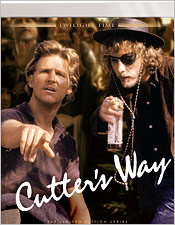Cutter’s Way (Blu-ray Review)

Director
Ivan PasserRelease Date(s)
1981 (April 12, 2016)Studio(s)
United Artists (Twilight Time)- Film/Program Grade: A+
- Video Grade: A
- Audio Grade: A
- Extras Grade: A
Review
Filmmakers and critics of a certain age tend to fetishize the 1970s, and it was undoubtedly a special time for a certain kind of American cinema, one marked by a post-Vietnam (and later post-Watergate) sense of disillusionment and antiestablishment sentiment that links films as disparate as Nashville, Taxi Driver, The Conversation, and Five Easy Pieces. Yet the focus on these and a handful of other iconic films, as well as the often repeated myth that Star Wars and (in a very different way) Heaven’s Gate ended the era of maverick auteurs in favor of homogenized corporate product, has left a lot of great movies in the dust – films that should be screened and talked about every bit as often as The Last Picture Show, Chinatown, and other masterpieces of the era have been somewhat lost to history. There is no better example of this than Ivan Passer’s Cutter’s Way (1981), a searing, absolutely perfect film that plays as a sort of companion piece to the far better known Chinatown. Like that film, it’s a bleak, cynical hangover of a movie that explicates precisely how the world is rigged in favor of the rich and powerful; unlike it, it’s set in the (then) present day and is stripped of all romanticism as a result.
It must have seemed like a brutal slap in the face to audiences who were embracing Ronald Reagan’s (utterly fabricated) optimism and the escapist pleasures of Raiders of the Lost Ark and Superman II. From the opening shot of a parade that succinctly captures the rape of land and people upon which plutocrats built America to its blunt, no room for hope final image, Cutter’s Way is a movie that says things have always been pretty bad (unless you’re a millionaire), and they’re only getting worse. Cinematically, it looks backward to the weary resignation of films like Arthur Penn’s Night Moves and Coppola’s The Conversation; politically, it’s depressingly prescient about where the class divide in America was heading. It tells the story of two friends who live in Santa Barbara, a community where the rich and the poor live in close proximity (at least they did then, before gentrification), and where title character Bone (Jeff Bridges) manages to navigate both worlds through an apathetic nature and affable charm. His best friend Cutter (John Heard) doesn’t find it so easy to assimilate; a Vietnam vet who lost an eye and an arm in the war, he spends most of his time drunk and constantly alienates everyone around him, including his long suffering wife (Lisa Eichorn).
When Bone gets a murky glimpse of a murderer fleeing the scene of the crime and things it might be a local oil magnate, Cutter sees a chance to get revenge on all the fat cats who he sees as his oppressors, the men who start the wars and exploit everyone around them without ever taking responsibility. He tries to convince Bone to go along with him on a blackmail scheme that is half-baked at best, and leads to inevitably tragic results. The plot is essentially a pretext for a portrait of a broken community and two broken men (as well as the broken woman, beautifully played by Eichorn, who loves them both), as well as of completely amoral greed in the form of the oil mogul. If this sounds simplistic, the execution is anything but; the film constantly works over the audience’s sympathies (Cutter is an exceptionally unlikable protagonist at times) and digs deeply into the issues that it raises without ever becoming truly explicit – even the devastating ending leaves enough room for interpretation to inspire a bit of debate among film historians Julie Kirgo and Nick Redman on the commentary track.
That commentary track is just one reason the Cutter’s Way Blu-ray is highly recommended, the other being the exceptional transfer of the film itself – a vast improvement over the less detailed and improperly color balanced standard-def DVD release of a decade or so back. Kirgo and Redman give a dense but entertaining production history of the film and brilliantly analyze it in terms of both cinema and politics – a great movie is made to seem even greater under their tutelage. The score by master composer Jack Nitzsche is just one of the movie’s many strengths, and it’s available here as an isolated score track; an original theatrical trailer is included as well. Though there are a few occasional scratches and pieces of dirt on the source material, the disc looks and sounds terrific – nearly perfect. The film itself, meanwhile, is perfect – a powerful, impeccably crafted film noir that deserves to be far, far better known.
- Jim Hemphill

